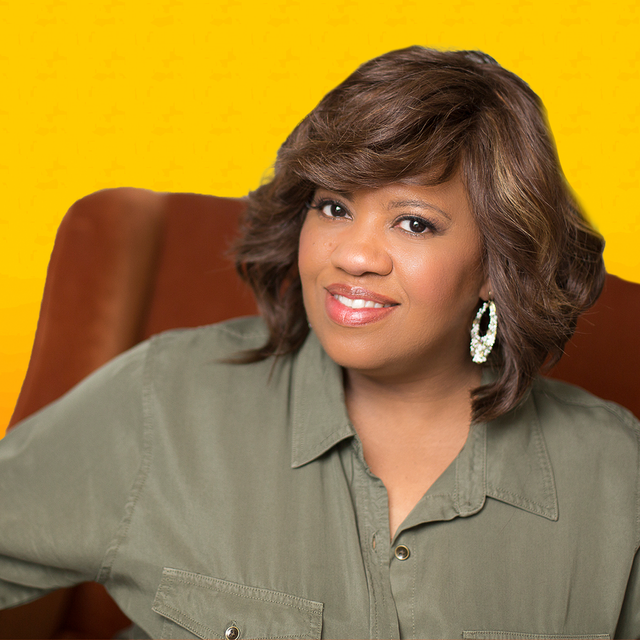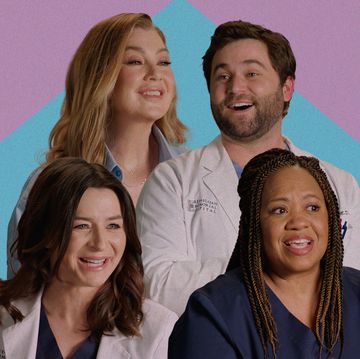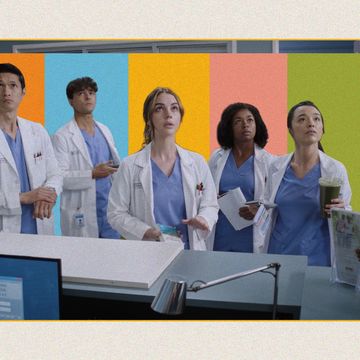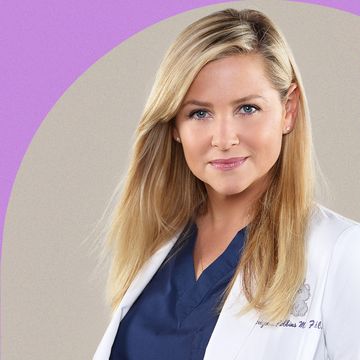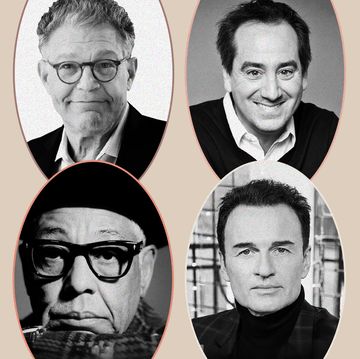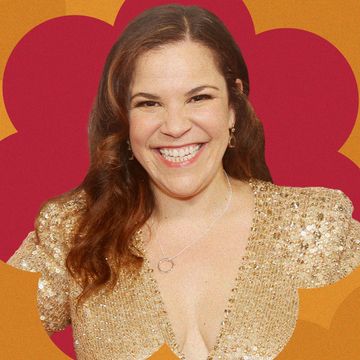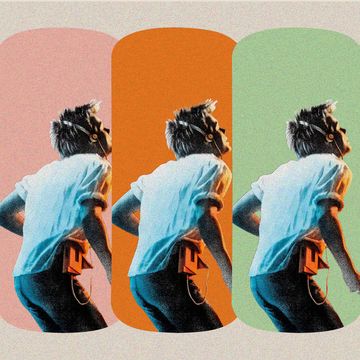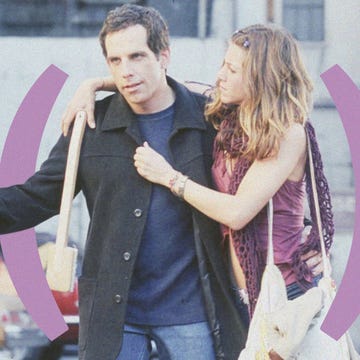Chandra Wilson knows the moment when she saw her future laid out. “I remember watching S. Epatha Merkerson doing Law & Order for 17 seasons like, ‘That, I wanna do that — I wanna tell that story,’” the actor recalls, speaking via Zoom from her trailer on the Grey’s Anatomy set. When we talk, it’s mid-August, and Wilson has just wrapped a table read for the show’s upcoming 18th season. Like Merkerson, best known for playing Lieutenant Anita Van Buren on the police procedural from 1993 to 2010, Wilson has been a mainstay on her own series since its humble beginnings — and, like the Law & Order star, staying as long as possible is absolutely the goal.
“I love the story of starting a thing and taking it all the way to its finish, and being there for the last scene on the last day, you know?” she continues. “There’s something about that story that is so incredibly fulfilling.”
Barring the Grey’s writers choosing chaos and offing Wilson’s beloved Miranda Bailey (hey, it’s Grey’s — crazier things have happened), there’s a strong chance that the star will get her wish. The 52-year-old has been a steady presence on the show since its 2005 premiere, when she made an unforgettable entrance as the character known by her terrified interns as “the Nazi.” Over the next 17 seasons, plenty of Wilson’s costars, including long-timers like Sandra Oh and Justin Chambers, left Grey’s for various reasons, but Wilson — along with castmates Ellen Pompeo and James Pickens Jr. — remained. Heading into the new season, she reveals the trio like to refer to themselves as Grey’s “OGs,” happily noting their singular positions any time they share scenes. When I joke that the three of them should get matching tattoos when the series (eventually) comes to an end, Wilson laughs loudly and shrugs like it’s a real possibility. And, honestly, after 16 years and 380 episodes, is anything not?
Wilson may be all about seeing things through these days, but back in 2004, when she scored the part of Bailey (who famously was intended to be “a tiny blonde with curls” until creator Shonda Rhimes saw the actor perform), she had no intention of signing up for a project the length of a teenager’s lifetime. In fact, even agreeing to a six-season contract “seemed wrong,” the star says now, looking amused by the memory. Worried that the show wouldn’t become popular enough to last and “as green as could be” in terms of major TV acting experience, Wilson focused on simply trying to translate her largely theater background (she’s appeared in productions like Caroline, or Change, On the Town, and Chicago) to the unfamiliar world of TV.
“My understanding about being a good actor and a good team player was to know my lines, be on my mark,” she says of her life before Grey’s. “I had no idea where the cameras were at any given time whatsoever — that wasn’t any of my business.”
Wilson’s newness to the screen didn’t stop her from making an indelible impression as Bailey, though. Her performance as the tough-talking but secretly mushy doctor has won raves from critics and earned her four Emmy nods for Best Supporting Actress. In both the show’s high-anxiety moments (that season six shooter-in-the-hospital finale, when Bailey struggles to keep a wounded colleague alive before being pulled out from under a bed by her ankles — a “fun” scene to film, Wilson says with no apparent irony) and its most heart-wrenching (Bailey’s season 16 miscarriage, for which she recalls channeling the pain of other women’s experiences to feel “grounded” in the moment), the actor has soared as the show’s complicated, achingly real emotional center. The fact that she plays a character who would give up her scrubs before voluntarily discussing her own feelings out loud just makes it all the more impressive.
Wilson is modest about her own achievements — when I bring up her recent (well-deserved) salary bump, she looks horrified and immediately launches into an explanation about contracts and renegotiations — and tends to credit the writing or the “excitement” of a scene for making her time on Grey’s stand out rather than her own work. But when it comes to one notable aspect of her performance as Bailey, even the actor can’t deny her own influence. In season 10, it was revealed that Bailey suffered from obsessive-compulsive disorder (OCD), and while the plotline was written into the script, it was Wilson who made sure it was treated as more than just an issue-of-the-day drama. While the actor doesn’t have OCD herself, she has family members who do, and that familiarity, along with diligent research and a desire to do right by the 2.2 million American adults diagnosed with the condition, can all be seen in her nuanced, surprisingly realistic portrayal.
“It could have been like a one- or two-episode arc,” Wilson says of Bailey’s original realization. “But I was like, ‘I don’t think that Bailey can have found the right pill and then gone on with her life, and then it’s all peaches and roses after that.’”
Time and time again, Wilson explains, she’s “sprinkled [Bailey’s OCD behaviors] in whenever I can,” making sure the character’s “checks” (obsessive rituals due to safety concerns, like quadruple-checking the oven is off or, like with Bailey, repeatedly counting items) are always visible on camera. Occasionally, these moments are scripted, but more often, Wilson says, they’re not — and so it’s a priority of hers to ensure that they make it in the final shot.
“Sometimes, I may have a conversation with a director and say, ‘Do you mind just doing a quick little bit down to my hands on this?’ And the producers can decide if they want to keep it or not. But if there’s something happening in the scene that I feel needs a little flavor of what she could be going through, I try and put it in,” Wilson says. “A lot is me just kind of making sure we haven’t lost course.”
Taking that kind of initiative didn’t always come naturally for the actor, who considers herself — and comes across — quite unlike the intimidating, sharp-tongued Bailey (although “my kids feel like [we’re similar] 100 percent,” she confesses). But throughout her tenure on Grey’s, Wilson has become more comfortable with the idea of being firm about what she feels she needs and making sure those needs are met.
Take directing; when Wilson first started helming episodes of the series back in season six, she says she worried about taking too much time in and out of hair and makeup for scenes she was also in as an actor and creating a “nightmare” for the crew. But after a few shows under her belt — and seeing fellow costars/directors Kevin McKidd and Debbie Allen switch back and forth between roles — Wilson relaxed into the position, eventually going on to direct 20 more episodes over the next decade.
These days, Wilson says, she’s also considering putting her hat in the ring as a producer. “I feel like that’s where the Virgo in me would thrive,” she quips. She’s seen costars like Pompeo and Allen take on the title before her, but she’s intent on forging her own way. “I would love the opportunity to test the kind of producer that I’m going to be,” she says quietly.
First things first, though, is filming Grey’s newest season — which, for those curious, takes place in a fantasy universe where enough people have gotten their Covid-19 vaccinations that case rates are way down and life has begun to return to normal. (Wilson says with no small amount of sadness, “We are in a world where we’ve done well, and we have to see if we need to change that tune at all.”) When season 17 wrapped up, Bailey was bristling at both the changes Meredith had made to the residency program and the addition of Koracick (Greg Germann) to the hospital’s board, but Wilson is mum when it comes to revealing any updates, mostly because she honestly has no idea. “I stopped asking years ago,” she admits with a laugh.
But, she quickly adds, “Whatever shows up in the script, I’m there; I’m game.” Spoken like a true O.G.
Rachel Simon is a writer with work inThe New York Times, Glamour, NBC News, Marie Claire, and many other outlets. Follow her on Twitter @rachel_simon.
Get Shondaland directly in your inbox: SUBSCRIBE TODAY
